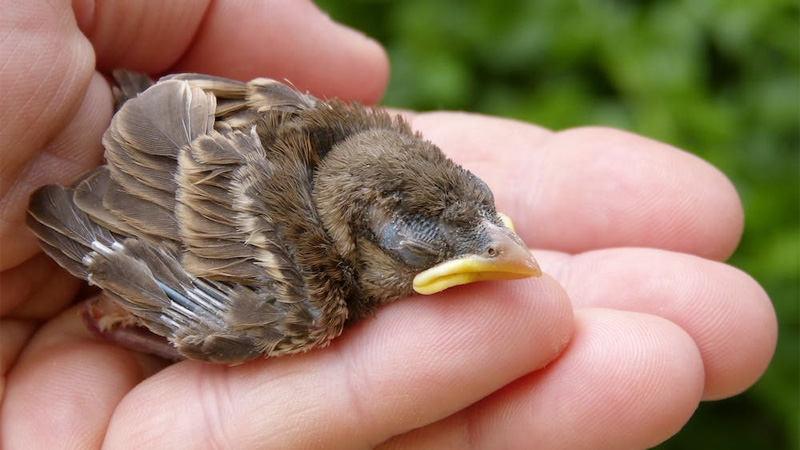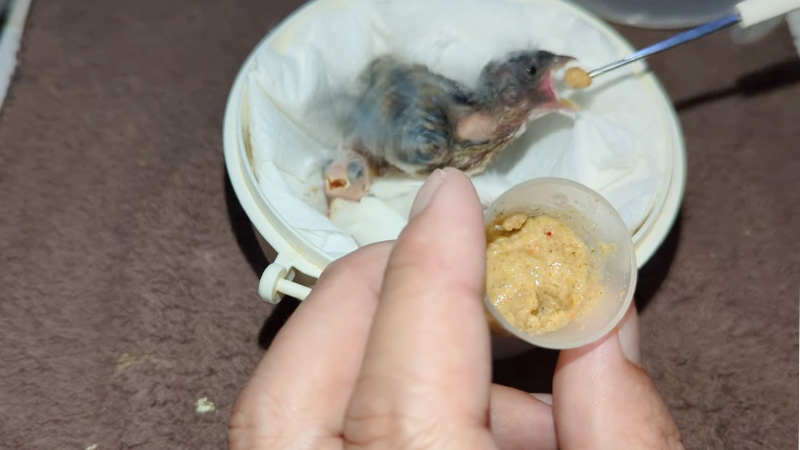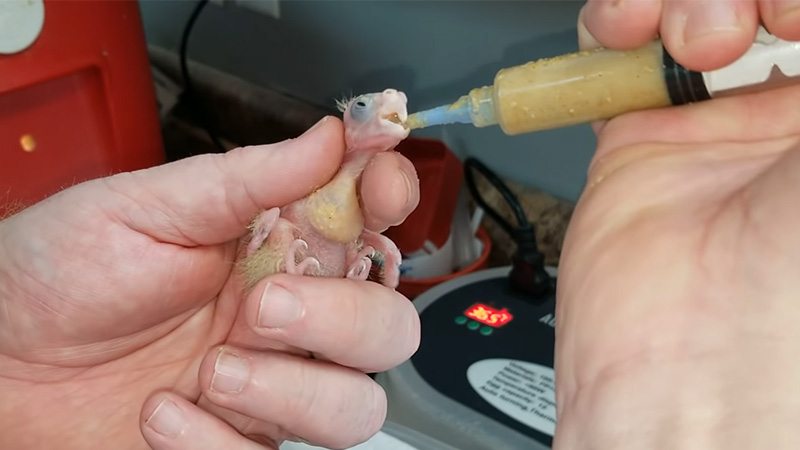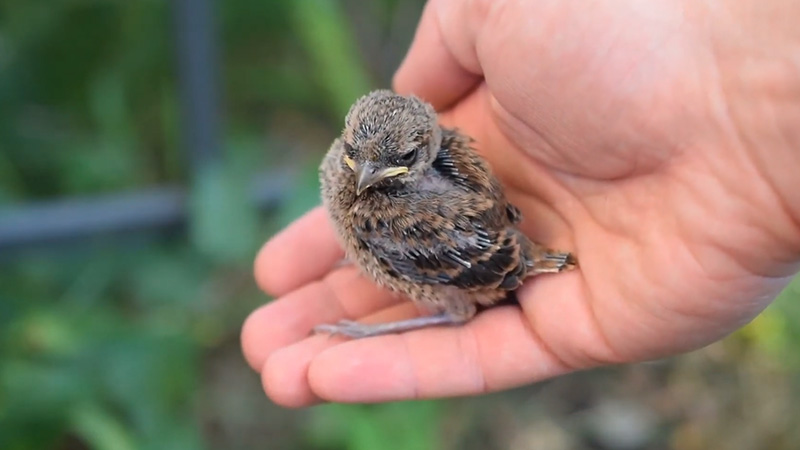Whether you have found an orphaned bird or are caring for a nestling that has fallen from its nest, providing proper nourishment is crucial for their growth and development. Feeding a baby bird requires delicate attention and knowledge to ensure its well-being.
In this guide, we will explore how to feed a baby bird. From understanding their dietary needs to preparing suitable food, we will provide you with practical tips and insights to help you become a nurturing caregiver.
Remember, feeding a baby bird is a temporary responsibility, and it is important to consult with wildlife experts or rehabilitators for guidance to ensure the best possible care for these delicate creatures.

How to Feed a Baby Bird?
Feeding a baby bird can be a delicate process, as their nutritional needs are specific and they require proper care. Here are some general guidelines on how to feed a baby bird:
Determine If the Bird Needs Help
Before intervening, make sure the bird is truly orphaned or in need of assistance. Some baby birds may appear abandoned but are actually being cared for by their parents. If you’re unsure, observe the bird from a distance for a while to see if the parents return.
Create a Makeshift Nest
If the bird is in immediate danger or truly orphaned, create a makeshift nest using a small box or container lined with soft materials like tissue or cloth. Ensure there are small drainage holes in the bottom to prevent water accumulation.
Warmth
Baby birds need to be kept warm, as they cannot regulate their body temperature effectively. Use a heating pad or a warm water bottle wrapped in a cloth to provide gentle warmth. Place it under one side of the nest, allowing the bird to move away if it gets too hot.
Research the Bird’s Diet
Different bird species have different dietary requirements. Research the specific species of bird you’re caring for to determine its diet. In general, baby birds are fed a mixture of insects, fruits, and seeds.
Prepare the Food

Depending on the bird’s age and species, you may need to prepare a specialized formula. Commercially available bird formulas can be mixed with water to create a suitable consistency. If you’re unsure, consult a veterinarian or a local wildlife rehabilitation center for guidance.
Feeding Technique
Use a small syringe or a clean dropper to feed the bird. Gently open the bird’s beak and place a small amount of food at the back of its throat. Be careful not to force the food, as it can cause choking. Allow the bird to swallow before offering more.
Feeding Frequency
Baby birds require frequent feedings, usually every 15 to 30 minutes during daylight hours. As they grow, the frequency can be gradually reduced. It’s important not to overfeed them, as it can lead to digestive issues.
Hydration
In addition to food, make sure the bird stays hydrated. Offer a few drops of water using a clean dropper or a shallow dish. Avoid using deep containers that could cause the bird to drown.
Seek Professional Help If Needed

Caring for a baby bird can be challenging, and it’s best to involve professionals whenever possible. Contact a local wildlife rehabilitation center or a veterinarian experienced in avian care for guidance and assistance.
Remember, it’s important to consult experts or professionals who can provide specific advice based on the bird species you’re dealing with.
What to Feed a Baby Bird?
The specific diet for a baby bird depends on its species, as different birds have different nutritional needs. However, here are some general guidelines on what to feed a baby bird:
Insectivorous Birds
Many baby birds, such as robins, sparrows, and swallows, are insectivorous. They require a diet rich in insects. You can feed them small, soft-bodied insects like mealworms, crickets, or small flies.
These can be purchased from pet stores or bait shops. Make sure the insects are gut-loaded, meaning they have been fed a nutritious diet before being offered to the bird.
Granivorous Birds
Some baby birds, like finches or doves, are granivorous, meaning they primarily eat seeds. You can provide them with a mixture of finely ground seeds, such as millet, canary seed, or commercial bird seed mixes. Soak the seeds in water or a specialized bird formula to soften them before feeding.
Frugivorous Birds
Certain baby birds, like some species of parrots or toucans, are frugivorous and require a diet rich in fruits.
Offer them small pieces of soft, ripe fruits like bananas, apples, or berries. Make sure to remove any seeds or pits that could be a choking hazard.
Specialized Formulas
For some baby birds, especially those that are very young or have specific dietary requirements, specialized formulas may be necessary. These formulas are available commercially and can be mixed with water to create a suitable consistency.
Follow the instructions on the packaging or consult a veterinarian or wildlife rehabilitation center for guidance.
It’s important to note that baby birds should not be fed bread, milk, or other human foods, as these can be harmful to their health.
Additionally, avoid giving them water directly from a dish, as they may accidentally drown. Instead, offer water using a clean dropper or a shallow dish.
If you’re unsure about the specific dietary needs of the baby bird you’re caring for, it’s best to consult a veterinarian or a local wildlife rehabilitation center for guidance. They can provide you with specific advice based on the bird’s species and age.
How to Prepare Formula Food for Baby Birds?

Preparing formula food for baby birds requires careful attention to ensure their nutritional needs are met. Here’s a general guide on how to prepare formula food for baby birds:
Research the Bird Species
Different bird species have different dietary requirements. Research the specific species of bird you’re caring for to determine the appropriate formula and feeding instructions.
This information can be found in avian care resources or by consulting a veterinarian or wildlife rehabilitation center.
Purchase a Suitable Formula
Commercially available bird formulas are designed to provide the necessary nutrients for baby birds.
These formulas can be found at pet stores, veterinary clinics, or wildlife rehabilitation centers. Choose a formula that is appropriate for the bird’s species and age.
Follow the Instructions
Each formula will have specific instructions on how to prepare it. Read and follow the instructions carefully to ensure proper mixing and consistency.
The formula may need to be mixed with warm water or a specific ratio of water to powder. Use clean utensils and containers to avoid contamination.
Warm the Formula
Baby birds require warm food, similar to their body temperature. Warm the formula by placing the container in a bowl of warm water or using a bottle warmer.
Test the temperature of the formula on your wrist to ensure it is not too hot or too cold. It should be lukewarm.
Mix Thoroughly
Stir or shake the formula well to ensure it is thoroughly mixed. Check for any lumps or clumps and break them up until the mixture is smooth and consistent.
Check the Consistency
The formula should have a consistency similar to that of the bird’s natural food. It should be thin enough to pass through a syringe or dropper easily, but not too watery. Adjust the amount of water or formula powder as needed to achieve the desired consistency.
Feed the Baby Bird
Use a clean syringe or dropper to feed the baby bird. Gently open its beak and place the tip of the syringe or dropper at the back of its throat.
Slowly dispense a small amount of formula, allowing the bird to swallow before offering more. Be careful not to force the food, as it can cause choking.
Store Any Remaining Formula
If there is leftover formula, follow the storage instructions provided with the formula. Some formulas may need to be refrigerated, while others can be stored at room temperature.
Discard any unused formula after the recommended time to prevent spoilage.
Remember, it’s important to consult experts or professionals who can provide specific advice based on the bird species you’re dealing with. They can guide you on the appropriate formula and feeding schedule for the baby bird.
FAQs
No, it is not recommended to use human baby formula for feeding baby birds. Human baby formula does not contain the necessary nutrients and balance required for the specific dietary needs of birds.
The feeding frequency for baby birds depends on their age and species. In general, baby birds require frequent feedings, usually every 15 to 30 minutes during daylight hours. As they grow, the frequency can be gradually reduced.
You can monitor the baby bird’s weight and behavior to determine if it is getting enough food. A healthy baby bird will have a rounded, full crop (a pouch-like structure in the throat where food is stored) after feeding.
Yes, a syringe or dropper can be used to feed a baby bird. Use a clean syringe or dropper with a small, soft tip. Gently open the bird’s beak and place the tip at the back of its throat. Slowly dispense a small amount of food, allowing the bird to swallow before offering more.
The timing for introducing solid food to a baby bird varies depending on the species. In general, once the bird is around 2-3 weeks old and its eyes are open, you can start introducing small pieces of soft food, such as mashed fruits or insects.
Final Words
As you embark on the journey of feeding a baby bird, remember that your efforts play a vital role in its survival and future.
By providing them with the right nutrition and care, you are giving them the best chance to thrive and eventually return to their natural habitat.
However, it is important to remember that wild birds are best raised by their own kind whenever possible. If you have any doubts or concerns, reach out to local wildlife rehabilitators or experts who can provide further guidance and support.
Your dedication and compassion in feeding a baby bird will not only make a difference in their lives but also deepen your connection with the natural world.
Together, let us nurture these delicate creatures and ensure a brighter future for our feathered friends.